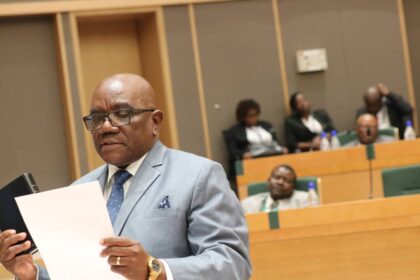THE MINISTER OF HOME AFFAIRS AND CULTURAL HERITAGE (HON. KAZEMBE): Thank you, Mr Speaker Sir, the scope of the Police Amendment Bill [H. B. 2, 2021] is as follows. The Police Amendment intends to amend the provisions of the Police Act Chapter [11:10] so that it complies with the provisions of the Constitution. The Bill seeks to achieve the following key objectives:
· To align the procedure for the appointment of the Commissioner-General of Police in the Police Act [Chapter 11:10] with the provisions of section 221 (1) of the Constitution.
· To align the tenure of the office of the Commissioner-General of the Police with provisions of Section 221 (2) of the Constitution.
· To align the provisions relating to the appointment, promotion, discharge, retirement and conditions of service of members of the police service with the provisions of the Constitution.
· To repeal Section 32 of the Police Act which gives right of trial before a Magistrate’s Court.
The Bill contains twenty (20) clauses, and they provide for the following:
Clause 1
The clause provides that the name of the Act shall be Police Amendment Act, 2021.
Clause 2
The Constitution employs the terms Commissioner General of Police instead of Commissioner and Police Service in place of Police Force. Clause 2 repeals the old terms and replaces them with the new terms as per the provisions of the Constitution.
Clause 3
In terms of Section 221 of the Constitution, when appointing the Commissioner-General of Police, the President consults the Minister that is responsible for Police. However, Section 5 of the Principal Act provides that the President appoints the Commissioner-General after consultation with a board consisting of the Chairman of the Police Service Commission, retiring Commissioner-General, and one other member. Clause 3 repeals this procedure and adopts the one that is provided for in the Constitution.
Clause 4
The Commissioner General’s tenure office is governed by Section 6 of the Principal Act which provides that he shall be appointed for a period of four years. The section does not limit the number of times that the tenure may be renewed. However, Clause 4 incorporates the provisions of Section 221 (2) of the Constitution which states that the Commissioner General’s tenure shall be for a period of (5) years renewable once.
Clause 5
In terms of Section 8 of the Principal Act, the Minister responsible for police can give directives to the Commissioner-General of Police but there is no provision that obliges the Commissioner-General of Police to comply with the directives. Clause 5 seeks to cure this anomaly by clearly instructing the Commissioner-General to take the necessary steps to comply with such directives from the Minister responsible for police in line with the provisions of Section 221 (4) of the Constitution.
Clause 6
This Clause empowers the Police Service Commission to formulate Standing Orders, on the advice of the Commissioner-General of Police in line with the provisions of Section 223 (1) (b) of the Constitution. This is an amendment to Section 9 of the Principal Act which empowers the Commissioner-General of Police in consultation with the Minister to make Standing Orders. However, it is also pertinent that the prerogative of drafting Standing Orders should be placed under the ambit of the Commissioner-General of Police as this is the common practice in other jurisdictions. This will allow the smooth running of the Police Services. Standing Orders are internationally known as Standard Operating Procedures and outlines how the organisation operates.
Clause 9 to 13
For purposes of commenting, it is trite to bunch Clauses 9 to 13. Firstly, in terms of Clause 9, the Police Service Commission, in consultation with the Commissioner-General, is given the powers to appoint any person to any rank in the Police Service and reprimand, suspend, reduce in rank or discharge any member other than an officer.
Secondly, Clause 10 highlights that the powers that the Commissioner-General has to promote non-commissioned members in terms of Section 16 of the Principal Act are now vested with the Police Service Commission by Clause 10.
Thirdly, Clause 11 conferred the power to reappoint members of the Regular Force on the Police Service Commission. In terms of Section 18 of the Principal Act, this was being done by the Commissioner-General of Police in consultation with the Police Service Commission.
Fourthly, under Clause 12, the authority that the Commissioner-General has in terms of Section 20 of the Principal Act to discharge members on medical grounds is transmitted to the Police Service Commission. The drafters have argued that this is consistent with the provisions of Section 340 (f) of the Constitution which provides that the power to appoint also includes the power to suspend or remove the person from office.
Also to note is Clause 13. According to the provisions of Section 21 of the Principal Act, the Commissioner-General needs the consent of the Minister before discharging non-commissioned members by reason of the abolition of his or her office or organisational restructure. However, Clause 13 provides that such approval needs to be sought from the Police Service Commission. This was also said to be in harmony with the provisions of Section 340 (1) (f) discussed in Clause 12 above.
Inasmuch as one would argue that these clauses are in line with the provisions of section 223 and 340 of the Constitution which outlines the various functions of the Police Service Commission, this is nonetheless difficult in operation. When focusing on the command given to the Commissioner-General under Section 221 (4) of the Constitution. It can be argued that as a security arm of the nation, the members of the Zimbabwe Republic Police are expected to exhibit a high standard of discipline. The powers to make Standing Orders, promote, transfer, discipline and discharge members are necessary to instil the required discipline and are an exercise of the Commissioner General’s constitutional command. However, these powers are being transferred to the Police Service Commission by Clauses 6, 9, 10, 12, 13 and 16 of the Bill. Within SADC, all the equivalent bodies of Commissioner General of Police are endowed with the said powers while bodies equivalent to the Police Service Commission play a supervisory role having jurisdiction to determine appeals from aggrieved members. Therefore, it can be argued that the Police Service Commission has limited capacity to deal with such issues. It is also eminent that it is an internationally accepted practice that security organs are not subjected to the steering of the civilian bodies.
Weight must be given to the provisions of Sections 221 of the Constitution which provides that the Police Service is under the command of the Commissioner-General of Police. It has been contended that the drafters of the Bill have concentrated in giving prominence to Section 223 of the Constitution which outlines the functions of the Police Service Commission, among other things, at the expense and detriment of Section 221 of the Constitution which places the Police Service under the command of the Commissioner-General of Police.
It has been argued that there is nothing further from the truth to assert that the Commissioner-General Police commands the police service when he does not have any powers to even reprimand a non-commissioned member.
Clause 14
The clause repeals Section 32, meaning all trials including those of officers will be conducted by boards of officers. This is because only commissioned officers could elect to be tried by Magistrates Court and the non-commissioned members did not have such a right. Such differential treatment of people within the same organisation was found to be unfair.
Clause 15
The clause reproves Section 46 of the principal Act which provided the places of trial by Magistrates Court have been repealed by Clause 14 above. It equally follows that Section 46 which dealt with incidental matters to these trials would also be repealed.
Clause 16
The powers that the Commissioner-General has in terms of Section 48 of the principal Act to discharge, demote or reprimand a member following a conviction for an offence are now vested with the Police Service Commission under this clause. This clause is susceptible to operational challenges because of the reasons highlighted under Clauses 9 -13 above.
Clause 17
Appeals to the Police Service Commission in terms of Section 51 of the principal Act no longer deter the execution of the sentence or determination appealed against. This means that the sentence will be executed despite the noting of an appeal with the Police Service Commission. Under Section 51 of the principal Act, once a member noted an appeal, it suspended the execution of the sentence and this had the effect of stalling the finalisation of disciplinary processes.
Clause 18
The Police Service Commission is authorised under this clause to delegate some of its functions to the Commissioner-General of the Police. This has been done by the creation of a new Section 55A dealing with the delegation of the Police Service Commissioner’s functions. However, such delegation will have to be done to Section 321 of the Constitution which prohibits delegation of appointment powers.
Clause 19
The non-liability of the police officers for acts done under irregular warrants is extended to cover legal proceedings for unlawful arrest or detention. Under Section 67 of the principal Act, police officers could be sued in their personal capacity even though they would have acted reasonably and in good faith. As such, the amendment extends the protection available to police officers to cover proceedings against unlawful detention.
Clause 20
The power to make regulations that the Minister has in terms of Section 72 of the principal Act is now conferred on the Police Service Commission. However, the Police Service Commission will make the regulations with the approval of the Minister responsible for police as per the provisions of Section 223 (2) of the Constitution.
This Bill is hereby submitted for your deliberation, Hon. Members.



